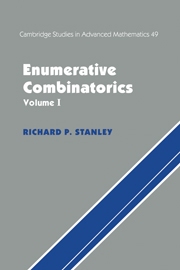Foreword
Published online by Cambridge University Press: 05 June 2012
Summary
It is regrettable that a book, once published and on the way to starting a life of its own, can no longer bear witness to the painful choices that the author had to face in the course of his writing. There are choices that confront the writer of every book: who is the intended audience? who is to be proved wrong? who will be the most likely critic? Most of us have indulged in the idle practice of drafting tables of contents of books we know will never see the light of day. In some countries, some such particularly imaginative drafts have actually been sent to press (though they may not be included among the author's list of publications).
In mathematics, however, the burden of choice faced by the writer is so heavy as to turn off all but the most courageous. And of all mathematics, combinatorics is nowadays perhaps the hardest to write on, despite an eager audience that cuts across the party lines. Shall an isolated special result be granted a section of its own? Shall a fledgling new theory with as yet sparse applications be gingerly thrust in the middle of a chapter? Shall the author yield to one of the contrary temptations of recreational math at one end, and categorical rigor at the other? or to the highly rewarding lure of the algorithm?
- Type
- Chapter
- Information
- Enumerative Combinatorics , pp. v - viPublisher: Cambridge University PressPrint publication year: 1997
- 1
- Cited by

